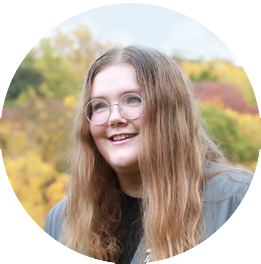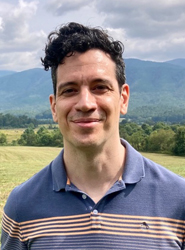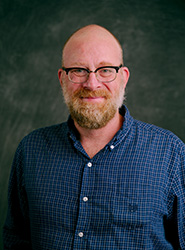“English is making you a better writer and making you a better person in the world that thinks critically about things”
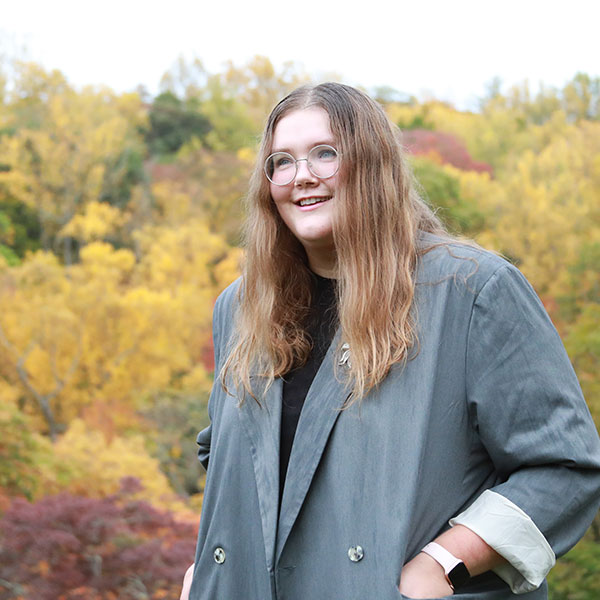
English alum P. Claire Dodson (‘15) has published stories in, among others, The New York Times, InStyle, O The Oprah Magazine, Rolling Stone, The Atlantic, and Fast Company, where she worked for several years before becoming an entertainment editor at Teen Vogue. Claire’s father, a journalist at Blount County’s The Daily Times, first inspired her to this career, but English helped her develop a poetic writing style, a critical eye, and an interest in different cultures. She caught up with Dr. Sally Harris, her former instructor and distinguished lecturer in English. They talked growing up in Knoxville, the teachers at Bearden High and the University of Tennessee who influenced her, and the work she currently does at Teen Vogue. This interview has been edited for length and clarity.
Harris: You’ve interviewed Olivia Rodrigo; you’ve interviewed Nico Parker and Marsai Martin and other cool celebrities, even Dolly Parton. What has been the coolest experience you’ve had with interviewing?
Dodson: I always say Dolly Parton. But that was just a 15-minute phone interview. So I didn’t really get to know her that well. I felt very starstruck just growing up in East Tennessee and having so much pride in her and wanting to be her, so I think that was the coolest in terms of being starstruck. But, honestly, the Olivia interview was probably the coolest thing I’ve done because I went to LA and we had breakfast together and then got to go to the photoshoot for a little bit, and then we talked on the phone, so it was more opportunities to see who she is in different contexts, which is hard in this interview climate. It’s not like the 60s, 70s, 80s, where journalists would go spend a few weeks, or like Almost Famous where they have months together to figure out what a person is like. So anytime I get to spend more than 30 minutes on the phone with someone is always a pleasure.
Harris: If you don’t mind explaining a little bit about what you do in your job, I mean, I would have thought that interviewing, you would have spent more time with them. So can you tell us a little bit more about your job as senior entertainment editor?
Dodson: So I am newly the senior editor, which means I’m now basically running the culture section, which is great. It’s always what I wanted to do, and it feels very surreal now that it’s happening. Right now, that means I’m covering the news side, which is a lot of aggregated news, but also the feature side, which is opinions, essays, interviews, editing some cover stories. But also writing them when I can. And a lot of talking with PR people and reading constantly and learning about what people care about. A lot of time on Twitter, I suppose, basically just figuring out teen books, culture, perspectives.
Harris: How do you learn about them? What sort of research do you do into them?
Dodson: It’s interesting with a younger audience. Teen Vogue’s audience, a large portion is actual teenagers, but there’s also a lot of 20-somethings. Our median age is around 20—so people older and younger. I did learn a lot about teens just from Twitter and my own fandom interests. I knew who BTS was before I started at Teen Vogue, but the editors who came before me were already covering K-pop and BTS so much. And that really made me a fan, seeing how teens were talking about them on Twitter or not even just teens, but people of any age were talking about them, made me a fan myself. That’s happened a lot at Teen Vogue, where I’ll become interested in something just because our readers are interested or we’ll test an up-and-coming celebrity and find that they really resonate with younger people. So it’s been fun. I definitely read Teen Vogue before I started, but obviously a lot more now and just tapping into what young people are thinking about.
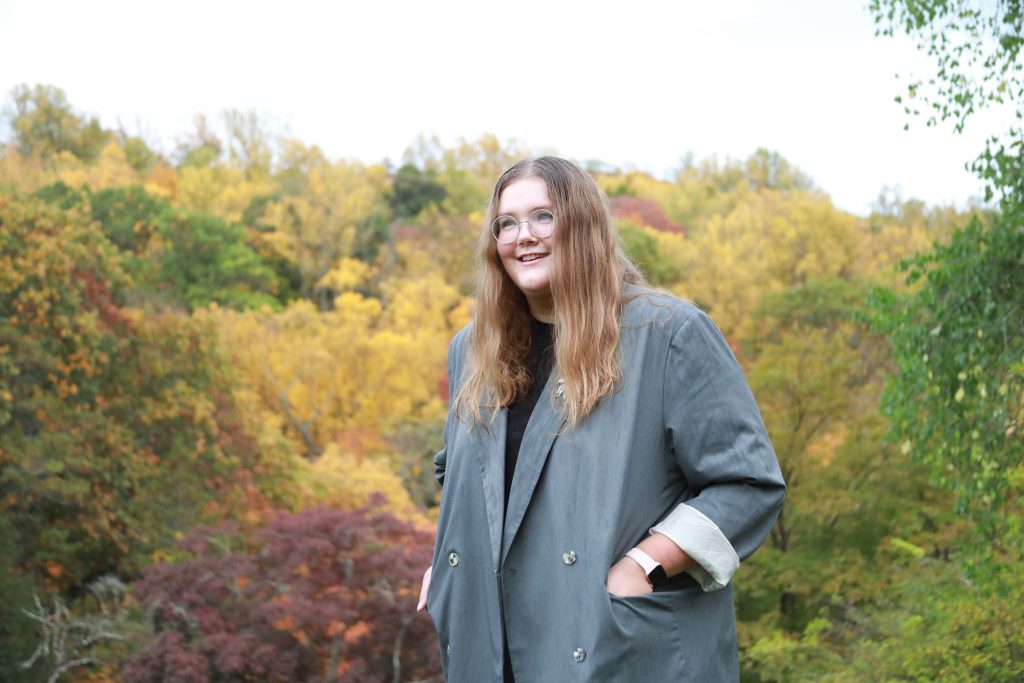
Harris: That’s interesting. So what was your path there? How did you get to Teen Vogue?
Dodson: I was definitely drawn to Teen Vogue because at the time they were really—this was 2018—[I] was reading them because they had shifted to doing a lot more political coverage and were incorporating politics and cultural context across the articles, so even entertainment stories were getting this really critical eye that I liked. And I think probably some of my interests overlap. I loved Disney Channel’s stuff growing up and that kind of thing is still relevant. Our audience still wants to read about Taylor Swift, who I listen to a lot. But in terms of how I actually got there, I was working at Fast Company before for a few years and one of my stories there was to interview the editor in chief of Teen Vogue to talk about their shift to political coverage. So I interviewed Phillip Picardi and wrote that story, and then a few months later, the Teen Vogue job came up in entertainment, and I knew I wanted to do entertainment. So I applied, and I emailed Phill, and I was like, remember when I wrote this for you? I’m gonna apply for this job. Hope you think I would be a good fit. And a shoutout to my former colleague, and great editor, Nikita Richardson who mock interviewed me before I went in to talk to the editors at Teen Vogue.
Harris: I look at all the stuff you’ve done. You’ve worked hard to build yourself up to there, right?
Dodson: I do think I have worked hard. But obviously, there’s so much more that goes into that than just someone working hard. I definitely think I got very lucky and I’ve always had really great teachers. So I credit that a lot with setting me up. All the way back to high school, my English teachers Mrs. Greenwell and Mrs. Hughes were amazing. My journalism teacher in high school, Mr. Vacek, was so helpful, just developing my voice as a writer and encouraging me. So I went to UT with some idea of the fact that I had a talent for this. And then, when I was at UT, I chose to study English instead of journalism, because I just always liked English more. And I definitely am happy I made that decision [and] had just really good professors.
I took SCOOP Magazine, which is journalism’s student magazine, that was one of the few journalism classes I took, with Pete Finch. And he was [a] very instrumental mentor and still is. He’s the one who took us on a trip to New York when I was a senior to meet magazine editors, which is when I met my editor at Fast Company. And so I pitched that editor after we visited. I would not have done that if Pete hadn’t encouraged us to write thank you notes and taught us the whole thing.
I remember in your class when we wrote cover letters. That was my first time perusing job boards, and I was applying for random PR internships, but that was my first practice doing that. So everything kind of felt like it was just building on top of each other.
When I got to Fast Company, I had another set of great editors who made my work better, and I was writing primarily for print, so they would just tear apart my work to make it fit on the page. So I kind of lost all sense of pretension about my writing, like I’m good at this, but I’m not above being edited, so [that] taught me a lot. And I was freelancing at the same time, cold pitching editors. And I did that in college too. I’ve always not been afraid of rejection, at least professionally. I credit it to when I was in middle school, in high school. I tried out for basketball teams seven years in a row and didn’t make a team until I was a junior in high school. I was the oldest one on junior varsity, I sat on the bench, and I was just happy to be there. As a result, it’s made me pretty fearless in terms of reaching out to editors. Reaching out to Phill, I was just like, might as well give it a shot, what do I have to lose? Obviously, a lot of different privileges have made me able to do that, but it’s good to not care so much about what people will think if you’re trying your best and you think you even have a little bit of talent. You can build off that and learn and become a better writer or editor over time.
Harris: That’s an interesting sort of progression, middle school and moving forward, through high school, and then college, and then after college, keeping that same attitude and taking freelance possibilities where you could. What do you think of as being really helpful to your experience while you were at UT?
Dodson: The Beacon is probably the most essential thing because it really taught me so much about working in a newsroom. When I was editor in chief of The Beacon, it was a lot of dealing with conflict and working with people who you don’t always get along with. And we were putting out a paper every day still at that point. That was my life for two years. And that definitely taught me so much that I then took into the professional workforce. I also took a lot of poetry classes with [Professor Emerita Marilyn] Kallet, who I still am in touch with. I just love her, and I think poetry has so much to offer to journalism and really informs my work. Sometimes my editor at Teen Vogue will be like, you’re being a little too poetic. And I’m like, but I want to be. So I think that informed a lot of my writing style.
Also, I was really sad to hear about Dr. [Bill] Larsen [1948-2021]. He was a big favorite of mine. I worked at the Barnes and Nobles Starbucks, and that’s where we met. And then I took his film classes. I do credit him with a lot of my knowledge about movies. I didn’t know any of that. He always had my Daily Beacon columns and would criticize them. I was like, thanks for reading.
Harris: You said that you were really glad that you were an English major. Is that partly because of the poetry? Or what were some of the reasons?
Dodson: Yeah, I think if I could go back and do my UT experience all over again, from an education standpoint, I would have taken more Women’s Studies, more African-American History, more broad culture studies. English gave me the next best thing to that. It dabbles so much in different cultures. I took Southern literature with Dr. Hardwig who I really love. That class really shaped me and [my] interests. He brought a really critical eye to that time and location in literature, and other classes I took would talk about feminist movements and history, and I didn’t know any of that going into college, so it was a really big, holistic learning experience. English is making you a better writer and making you a better person in the world that thinks critically about things. So I feel like that’s something [that has] really shaped me.
Harris: That’s exciting and good to hear that you were able to get that experience and felt like that. Going back to what we talked about at the beginning, about how you got into certain areas because of Teen Vogue, you’re a fan fiction fan, right?
Dodson: Totally. I think my goal with Teen Vogue’s culture section is really to bring a fandom perspective. I’m not trying for us to speak to a general audience or broad entertainment audience. I really care about things that are drawing large numbers of people, or even especially impassioned, smaller numbers of people to something or someone. Any kind of fandom story or thing really always captured my interest. I’ve always read fanfic—from when I was 11 or 12—and the habit has just stuck around. Anything that allows me to look at fandom is great. One of my favorite columnists that we have is this writer named Stitch who has a column called fan service. They’re always unpacking so many different facets of fandom, whether it’s parasocial relationships, or racism in fandom, or different portrayals of characters and how that works. A larger context. I love their work and spotlighting that kind of journalism is exciting to me because fans get so often written off as rabid teenage girls, but not only are the teenage girls not rabid, they’re so much more than just teenagers. All these things speak to people who are older. I’ve interviewed BTS fans who are in their 60s and 70s. It’s been one of my favorite parts, stuff about fandom.
Harris: Thank you for taking the time. One last question. What do you miss most about Knoxville?
Dodson: Okay, I’ll say this not as an endorsement of them now because it’s a pandemic, and people should not be doing this, but house parties in the fort. But again, do not go to them if you’re not vaccinated, okay?
